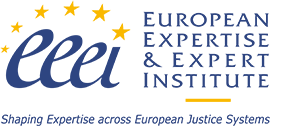Find an expert II – WP2 Convergence work national registers – Status report
Extract by Martine Otter from Wolfgang Jacobs report with complementary information by Verena Wirwohl

Objectives
As defined in the global project, WP2 has three complementary objectives:
- Define minimum criteria for a person to qualify as a “judicial experts”, in terms of competence, specific knowledge on procedural rules and ethics;
- Define standards to be met by bodies in charge of keeping experts’ directories in each member State;
- Provide specification and business plan for the creation and operation of the European register of judicial experts.
The team




Three groups are working on this package, each one with a specific objective:
- WG1 has to define common criteria for Judicial experts and to present them in a practical way. The difficulty is to be very specific. The Group must respond to the questions: what is competency? What are the ethical criteria? What is Independence? Impartiality?
The next meetings of WG1 will be held online on the 20th of September and the 3rd of November in Berlin. The participants of the group are currently working on filling out the questionnaires for the assigned countries. At the meeting in Berlin in late fall, the Group plan to then evaluate the aforementioned questionnaires for similarities and differences. The aim of the meeting is to come closer to its assigned goal, a universally valid definition of experts. - WG2 is in charge to define standards to be met by bodies in charge of Expert directories: who should be in charge and what is their role. It covers a lot of questions and a wide range of procedures. Is the body defined at a regional or national level? Who is it composed of? And also, how are data updated, managed and protected?
- WG3 team works on requirements for experts to be registered in a directory and to stay on the directory. Which procedure for assessment? Which criteria for education, practical experience, insurance? What oath to take? Which duration of registering? Limitation? Training?
What is done
Each working group has collected existing documents and prepared a set of required information. That has been combined in one questionnaire, from which the information can be filled out per country. At least the information of the pilot countries (Belgium, France, Italy, Luxembourg, Poland, Romania) must be complete.
Next steps
Several questions of the questionnaire could also be used for public consultation of followers of social networks to support the communication of the project.
Proposals of the working group will be merged to be proposed in March 2023 at the consensus conference as a common set of criteria and requirements.
And after the conference, decision taken during the conference will be documented and submitted to European Commission and e-Justice.





